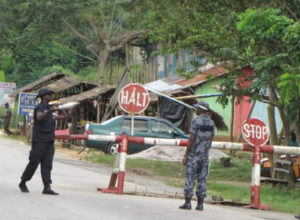Porous borders expose Ghana to violent extremist activities – NCCE

The National Commission for Civic Education (NCCE) says Ghana is exposed to activities of violent extremists due to the porous nature of the country’s territorial boundaries, especially in the northern part.
It said that was because all the neighbouring countries to Ghana had suffered attacks by violent extremists and Ghana’s porous borders had made it possible for the free movement of violent extremists and weapons in and out of the country.
Mr John Yibile, the Deputy Upper West Regional Director of the NCCE, said this in Nadowli during a dialogue session between the Ghana Police Service and the community to build trust and improve police-community relations and confidence.
The dialogue was at the behest of the Nadowli-Kaleo District Directorate of the NCCE under the European Union-funded “Preventing and Containing Violent Extremism (PCVE) in Northern Regions of Ghana project.
Mr Yibile said there was need for the Police-Community dialogue to proffer strategies to “prevent, contain and counteract violent extremism and safeguard the security of the people and the state”.
“Effective modern policing calls for collaboration, co-operation and inclusive decision-making of all stakeholders at all levels.
This relationship between the police and the community is essential in maintaining peace and order, and general security”, he explained.
Mr Yibile encouraged members of the public to resort to non-violent means to settle disputes as violent extremists took advantage of existing conflicts in society to strike.
In a presentation during the dialogue, Superintendent Mr James Ankan, the Nadowli-Kaleo District Police Commander, observed that violent extremism could stem from religious, political, ideological or chieftaincy conflicts, among others.
He explained that factors such as lack of logistics, distance of police from the community and fear of betrayal of informants by the police, among others, militated against the efforts of the police and the community to fight violent extremism.
He appealed for support to the police and other security agencies to identify individuals at risk of radicalisation, strong stakeholder coordination and relevant information sharing as potent means of countering violent extremism.
“As a nation, to overcome terrorism and violent extremism, it is a duty for all of us to promote tolerance and national cohesion within and among ourselves irrespective of our religious beliefs, ethnicity, gender and political differences”, Mr Ankan stated.
Madam Stella Dugrah, a Principal Civic Education Officer at the Nadowli-Kaleo District NCCE office, stated that the dialogue was to create a platform for the Ghana Police Service and the communities to interact and strengthen their relationship in peacebuilding.
She said it would help enhance trust and understanding between the two institutions and strengthen their cooperation for effective law enforcement, address the root causes of radicalisation, enhance community resilience and ensure community safety.
Traditional leaders, Assembly Members, security personnel and the people of Nadowli, among others, participated in the dialogue session.
Source: GNA
